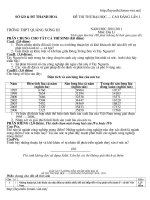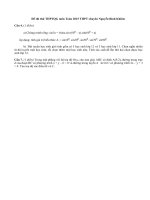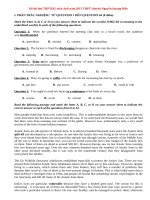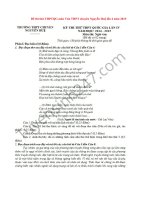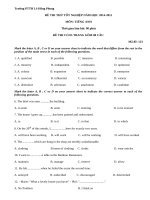- Trang chủ >>
- Đề thi >>
- THPT Quốc Gia
Đề thi thử THPTQG môn Anh 2017 THPT Quảng Xương 1
Bạn đang xem bản rút gọn của tài liệu. Xem và tải ngay bản đầy đủ của tài liệu tại đây (121.7 KB, 11 trang )
SỞ GD&ĐT THANH HÓA
TRƯỜNG THPT QUẢNG XƯƠNG 1
ĐỀ THỬ THPT QUỐC GIA LẦN 1 NĂM HỌC 2016 - 2017
ĐỀ THI MÔN TIẾNG ANH
Thời gian làm bài: 60 phút, không kể thời gian giao đề.
Mark the letter A, B, C, or D on your answer sheet to indicate the underlined
part that needs correction in each of the following questions.
1. The wooden fence surrounded the factory is beginning to fall down
because of the rain.
A. is begining
B. wooden
C. surrounded
D. because
of
2. The amounts of oxygen and nitrogen in the air almost always remain
stable, but the amount of water vapor vary considerably.
A. vary
B. almost always
C. The amount of
D. stable
3. Quinine, cinnnamon, and other useful substances are all derived of the
bark of trees.
A. are
B. bark of trees
C. derived of
D. other useful
substances
Read the following passage and mark the letter A,B,C or D on your answer sheet
to indicate the correct answer to each of the questions from 4 to 10.
During the seventeenth and eighteenth centuries, almost nothing was written
about the contributions of women during the colonial period and the early
history of the newly formed United States. Lacking the right to vote and absent
from the seats of power, women were not considered an important force in
history. Anne Bradstreet wrote some significant poetry in the seventeenth
century, Mercy Otis Warren produced the best contemporary history of the
American Revolution, and Abigail Adams penned important letters showing
she exercised great political influence over her husband, John, the second
President of the United States. But little or no notice was taken of these
contributions. During these centuries, women remained invisible in history
books.Throughout the nineteenth century, this lack of visibility continued,
despite the efforts of female authors writing about women. These writers, like
most of their male counterparts, were amateur historians. Their writings were
celebratory in nature, and they were uncritical in their selection and use of
sources.During the nineteenth century, however, certain feminists showed a
keen sense of history by keeping records of activities in which women were
engaged. National, regional, and local women's organizations compiled
accounts of their doings. Personal correspondence, newspaper clippings, and
souvenirs were saved and stored. These sources from the core of the two
greatest collections of women's history in the United States one at the
Elizabeth and Arthur Schlesinger Library at Radcliffe College, and the other
the Sophia Smith Collection at Smith College. Such sources have provided
valuable materials for later Generations of historians.Despite the gathering of
more information about ordinary women during the nineteenth Century, most
of the writing about women conformed to the "great women" theory of History,
just as much of mainstream American history concentrated on "great men." To
demonstrate that women were making significant contributions to American
life, female authors singled out women leaders and wrote biographies, or else
important women produced their autobiographies. Most of these leaders were
involved in public life as reformers, activists working for women's right to vote,
or authors, and were not representative at all of the great of ordinary woman.
The lives of ordinary people continued, generally, to be untold in the American
histories being published.
tin-detail-inject-middle-content
4. In the last paragraph, the author mentions all of the following as possible
roles of nineteenth- century "great women" EXCEPT
A. reformers
B. politician C. activists for women's rights
D. authors
5. The word "they" in the 2nd paragraph refers to
A. sources
B. efforts
C. authors
D.
counterparts
6. In the first paragraph, Bradstreet, Warren, and Adams are mentioned to
show that
A. even the contributions of outstanding women were ignored
B. poetry produced by women was more readily accepted than other writing
by women
C. only three women were able to get their writing published
D. a woman's status was changed by marriage
7. The word "representative" in the last paragraph is closest in meaning
to
_
A. satisfied
B. typical
C. distinctive
D. supportive
8. In the 2nd paragraph, what weakness in nineteenth-century histories does
the author point out?
tin-detail-inject-middle-content
A. The sources of the information they were based on were not necessarily
accurate.
B. They were printed on poor-quality paper.
C. They left out discussion of the influence of money on politics.
D. They put too much emphasis on daily activities.
9. What use was made of the nineteenth-century women's history materials
in the Schlesinger Library and the Sophia Smith Collection?
A. They provided valuable information for twentieth- century historical
researchers.
B. They formed the basis of college courses in the nineteenth century.
C. They were shared among women's colleges throughout the United
States.
D. They were combined and published in a multivolume encyclopedia.
10. What does the passage mainly discuss?
A. The place of American women in written histories
B. The "great women" approach to history used by American historians
C. The keen sense of history shown by American women
D. The role of literature in early American histories
Mark the letter A, B, C, or D on your answer sheet to indicate the sentence
that is closest in meaning to each of the following questions.
tin-detail-inject-middle-content
11.
A.
B.
C.
D.
12.
A.
B.
C.
D.
I would rather you wore something more formal to work.
I'd prefer you wearing something more formal to work.
I'd prefer you to wear something more formal to work.
I'd prefer you should wear something more formal to work.
I'd prefer you wear something more formal to work.
Had we left any later, we would have missed the train.
We didn't miss the train because it left late.
We left too late to catch the train.
Because the train was late, we missed it.
We almost missed the train.
13. "Why can't you do your work more carefully?" said Henry's boss.
A. Henry's boss criticized him for doing his job carelessly.
B. Henry's boss asked him not to do his job with care.
C. Henry's boss suggested doing the job more carefully.
D. Henry's boss warned him to to the job carefully.
Mark the letter A, B, C, or D on your answer sheet to indicate the word whose
underlined part differs from the other three in pronunciation in each of the
following questions.
tin-detail-inject-middle-content
14. A. lives
15. A. picked
B. plays
B. worked
C. works
C. naked
D. buys
D. booked
Mark the letter A, B, C, or D on your answer sheet to indicate the
sentence that best combines each pair of sentences in the following
questions.
16. He felt tired. However, he was determined to continue to climb up the
mountain.
A. Tired as he might feel, he was determined to continue to climb up the
mountain
B. He felt so tired that he was determined to continue to climb up the
mountain.
C. Feeling very tired, he was determined to continue to climb up the
mountain.
D. As a result of his tiredness, he was determined to continue to climb up
the mountain.
17. The agreement ended six-month negotiation. It was signed yesterday.
A. The agreement which ends six-month negotiation was signed yesterday.
B. The negotiation which lasted six months was signed yesterday.
C. The agreement which was signed yesterday lasted six months.
tin-detail-inject-middle-content
D. The agreement which was signed yesterday ended six-month
negotiation.
Mark the letter A, B, C, or D on your answer sheet to indicate the word that
differs from the other three in the position ofprimary stress in eachof the
followingquestions.
18. A. cosmetics
B. fertility
C. experience
D. economics
19. A. informality
B. appropriate
C. situation
D. entertainment
Read the following passage and mark the letter A,B,C or D on your
answer sheet to indicate the correct answer to each of the questions
from 20 to 27It is commonly believed that school is where people go to get an
education. Nevertheless, it has been said that today children interrupt their
education to go to school. The difference between schooling and education
implied by this remark is important.Education is much more open-ended and
all-inclusive than schooling. Education knows no limits. It can take place
anywhere, whether in the shower or on the job, whether in the kitchen or on a
tractor. It includes both the formal learning that takes place in school and the
whole universe of informal learning. The agent (doer) of education can vary
from respected grandparents to the people arguing about politics on the radio,
from a child to a famous scientist. Whereas schooling has a certain
predictability, education quite often produces surprises. A chance
conversation with a stranger may lead a person to discover how little is known
of other religions. People receive education from infancy on. Education, then,
is a very broad, inclusive term; it is a lifelong process, a process that starts
long before the start of school, and one that should be a necessary part of
one's entire life.Schooling, on the other hand, is a specific, formalized
process, whose general pattern varies little from one setting to the next.
Throughout a country, children arrive at school at about the same time, take
the assigned seats, are taught by an adult, use similar textbooks, do
homework, take exams, and so on. The pieces of reality that are to be
learned, whether they are the alphabet or an understanding of the workings
of governments, have been limited by the subjects being taught. For example,
high school students know that they are not likely to find out in their classes
the truth about political problems in their society or what the newest
filmmakers are experimenting with. There are clear and undoubted conditions
surrounding the formalized process of schooling.
tin-detail-inject-middle-content
20. In the passage, the expression "children interrupt their education to
go to school" mostly implies that
.
A. schooling prevents people discovering things
B. schooling takes place everywhere
C. all of life is an education
D. education is totally ruined by schooling
21. What does the writer mean by saying "education quite often produces
surprises"?
A. Educators often produce surprises.
B. Informal learning often brings about unexpected results.
C. Success of informal learning is predictable.
D. It's surprising that we know little about other religions.
22. Which of the following would the writer support?
A. Without formal education, people won't be able to read and write.
B. Going to school is only part of how people become educated.
C. Schooling is of no use because students do similar things every day.
D. Our education system needs to be changed as soon as possible.
23. According to the passage, the doers of education
are
.
tin-detail-inject-middle-content
A. only respected grandparents
B. mostly famous scientists
C. mainly politicians
D. almost all people
24. Which of the following is TRUE according to the passage?
A. Education and schooling are quite different experience.
B. The more years students go to school, the better their education is.
C. Students benefit from schools, which require long hours and homework.
D. The best schools teach a variety of subjects.
25. The word "they" in the last paragraph refers
to
.
A. workings of governments
B. newest filmmakers
C. political problems
D. high school students
26. The word "all-inclusive" in the passage mostly
means
.
A. including everything or everyone
C. involving many school subjects
tin-detail-inject-middle-content
B. going in many directions
D. allowing no exceptions
27. This passage is mainly aimed at
.
A. telling the difference between the meanings of two related words
"schooling" and "education"
B. telling a story about excellent teachers
C. listing and discussing several educational problems
D. giving examples of different schools
Mark the letter A, B, C, or D on your answer sheet to indicate the word(s)
CLOSEST in meaning to the underlinedword(s) ineachof the
followingquestions.
28. When I mentioned the party, he was all ears.
A. using both ears B. listening neglectfully C. listening attentively D.
partially deaf
29. John wants to buy a new car, so he starts setting aside a small part of
his monthly earnings,
A. spending on
B. putting out
C. using up
D. saving up
Read the following passage and mark the letter A, B, C, or D on your answer
sheet to indicate the correct word orphrasethat best fits eachof the numbered
blanks from 30 to 34.
HOW TO AVOID MISCOMMUNICATION IN THE WORKPLACEAs a smallbusiness owner, you can avoid many problems simply by improving
communication in your office. By clarifying everyone's expectations and roles,
you'll help to (30)
greater trust and increased productivity
among employees. Here are a few tips for doing so.Practice active listening.
The art of active listening includes (31)
close attention to
whatanother person is saying, then paraphrasing what you've heard and
repeating it back. Concentrate (32)
the conversation at hand
and avoid unwanted interruptions (cell phone calls, others walking into your
office, etc.). Take note of how your own experience and values may color your
perception.Pay attention to non-verbal cues. We don't communicate with
words alone. Every conversation comes with a host of nonverbal cues - facial expressions, body language, etc. - that may (33)
contradict what we're saying. Before addressing
a staff member or (34)
a project conference, think carefully about
your tone of voice, how you make eye contact, and what your body is
"saying." Be consistent throughout.Be clear and to the point. Don't cloud
instructions or requests with irrelevant details, such as problems with past
projects or issues with long-departed personnel. State what you need and
what you expect. Ask, "Does anyone have any questions?" Demonstrate that
you prefer questions up-front as opposed to misinterpretation later on.
tin-detail-inject-middle-content
30.
A. set up
31.
A. showing
32.
A. for
33.
A. intentional
unintentionally
34.
A. to lead
B. establish
C. create
D. build
B. paying
C. using
D. spending
B. to
B. unintentional
B. being led
C. on
C. intentionally
C. leading
D. in
D.
D. lead
Mark the letter A, B, C, or D on your answer sheet to indicate the correct
answer to each of the following questions.
35. He was offered the job thanks to his
performance during his
job interview.
A. impressive
B. impressively
C. impression
D.
impress
36. Someone who is _
__ is hopeful about the future or the success of
something in particular.
A. pessimist
B. optimistic
C. optimist
D.
pessimistic
tin-detail-inject-middle-content
37. The preparations _
by the time the guests
.
A. have finished / arrived
B. have been finished / arrived
C. had been finished / arrived
D. had finished / arrived
38. As an
_, Mr. Pike is very worried about the increasing of
teenager crimes.
A. educational
B. education
C. educator
D.
educate
39.
turned out to be true.
A. Everything she had told us which
B. Everything where she had
told us
C. Everything she had told us
D. That everything she told us
40. You'd better get someone
A. redecorated
B. to redecorate
your living room.
C. redecorating.
D.
redecorate
41. Can you take
of the shop while Mr. Green is away?
A. operation
B. charge
C. management
running
tin-detail-inject-middle-content
D.
42. They held a party to congratulate their son
his success to
become an engineer.
A. in
B. on
C. with
D. for
43. They always kept on good _
with their next-door neighbors for
the children's sake.
A. terms
B. relations
C. will
D. relationship
44. They had invited over one hundred guests,
_.
A. not any of whom I knew
whom
B. I did not know any of
C. I knew none of who
45. Please
welcome.
A. come away
round
D. none of whom I knew
and see us when you have time. You are always
B. come to
C. come in
D. come
46. Not only
to determine the depth of the ocean floor, but it is
also used to locate oil.
A. seismology is used
B. is seismology used
C. using seismology
tin-detail-inject-middle-content
D. to use seismology
Mark the letter A, B, C, or D on your answer sheet to indicate the most
suitable response to complete each of the following exchanges.
47.
A.
"What a great hair cut, Lucy!"
It's my pleasure.
C. Thanks. It's very kind of you to do this
compliment.
-"_
"
B. Oh, yes. That's right.
D. Thank you. That's a nice
48.
"A motorbike knocked Ted down"
-"
"
A. How terrific!
B. Poor him!
C. What is it now?
D. What a motorbike!
Mark the letter A, B, C, or D onyouranswer sheet to indicate the word(s)
OPPOSITE in meaning to the underlinedword(s) ineachof the
followingquestions.
49.
A trial must be fair and impartial.
A. apprehensive
unprejudiced
B. hostile
C. biased
D.
50. After her husband's tragic accident, she took up his position at the
university.
A. incredible
B. boring
tin-detail-inject-middle-content
C. mysterious
D. comic
Mã đề/ Câu
1
2
3
4
5
6
7
8
9
10
11
12
13
14
15
16
17
18
19
20
21
22
23
24
25
26
27
28
29
30
31
32
33
34
35
36
37
38
39
40
41
42
43
44
45
345
C
A
C
B
C
A
B
A
A
A
B
D
A
C
C
A
D
D
B
C
B
B
D
A
D
A
A
C
D
D
B
C
D
C
A
B
C
C
C
B
B
B
A
D
D
46
47
48
49
50
B
D
B
C
D
